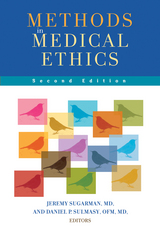
Advance directives—such as living wills and health care proxies—are documents intended to declare and preserve the health care choices of patients if they become unable to make their own decisions. This book provides a comprehensive overview of advance directives and clear, practical directions for writing and interpreting them.
Nancy M.P. King provides a legal, philosophical, and historical analysis of the moral and legal force of advance directives. She explains the types and models of advance directives currently in use and offers guidelines for individuals seeking to write, read, and use directives to promote individuals' health care choices within the laws of their own states.
King emphasizes that advance directives are not orders given by patients to their doctors; instead, they are documents that invite conversation between doctors and patients about health care decisions of great importance. The purpose of advance directives is to support patients' health care choices, and the book promotes a thoughtful use of advance directives that is best calculated to achieve that purpose, whatever form individual advance directives may take.
This new edition has been updated to reflect the many changes in advance directive statutes since 1991, including expanded discussions of health care proxy statutes, the impact of the Patient Self-Determination Act and the Supreme Court's Cruzan decision. King also has extended her analysis of the implications for advance directives of managed care, resource allocation, resource scarcity, and the debate over futile treatment at the end of life.
Making Sense of Advance Directives is a valuable handbook for patients, health care providers and administrators, patient counselors, lawyers, policymakers, and any individual interested in advance directives.

Medical ethics draws upon methods from a wide array of disciplines, including anthropology, economics, epidemiology, health services research, history, law, medicine, nursing, philosophy, psychology, sociology, and theology.
In this influential book, outstanding scholars in medical ethics bring these many methods together in one place to be systematically described, critiqued, and challenged. Newly revised and updated chapters in this second edition include philosophy, religion and theology, virtue and professionalism, casuistry and clinical ethics, law, history, qualitative research, ethnography, quantitative surveys, experimental methods, and economics and decision science. This second edition also includes new chapters on literature and sociology, as well as a second chapter on philosophy which expands the range of philosophical methods discussed to include gender ethics, communitarianism, and discourse ethics. In each of these chapters, contributors provide descriptions of the methods, critiques, and notes on resources and training.
Methods in Medical Ethics is a valuable resource for scholars, teachers, editors, and students in any of the disciplines that have contributed to the field. As a textbook and reference for graduate students and scholars in medical ethics, it offers a rich understanding of the complexities involved in the rigorous investigation of moral questions in medical practice and research.
READERS
Browse our collection.
PUBLISHERS
See BiblioVault's publisher services.
STUDENT SERVICES
Files for college accessibility offices.
UChicago Accessibility Resources
home | accessibility | search | about | contact us
BiblioVault ® 2001 - 2024
The University of Chicago Press









